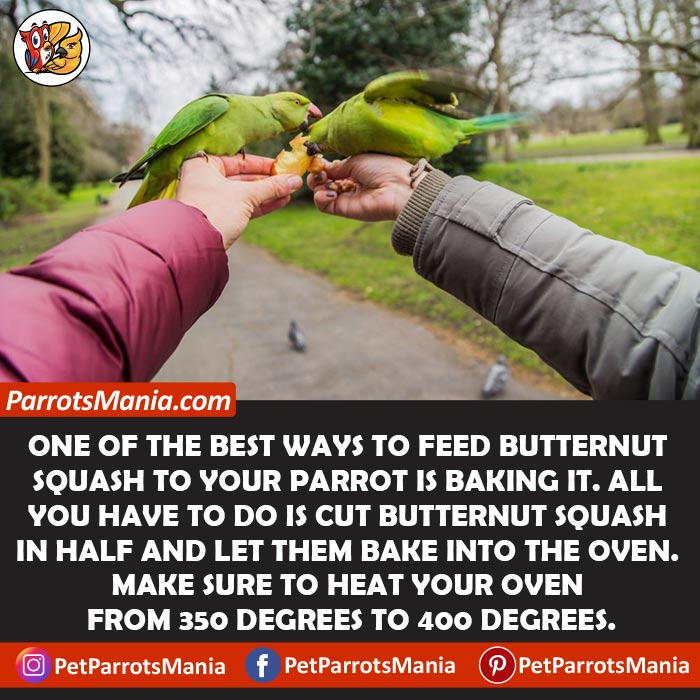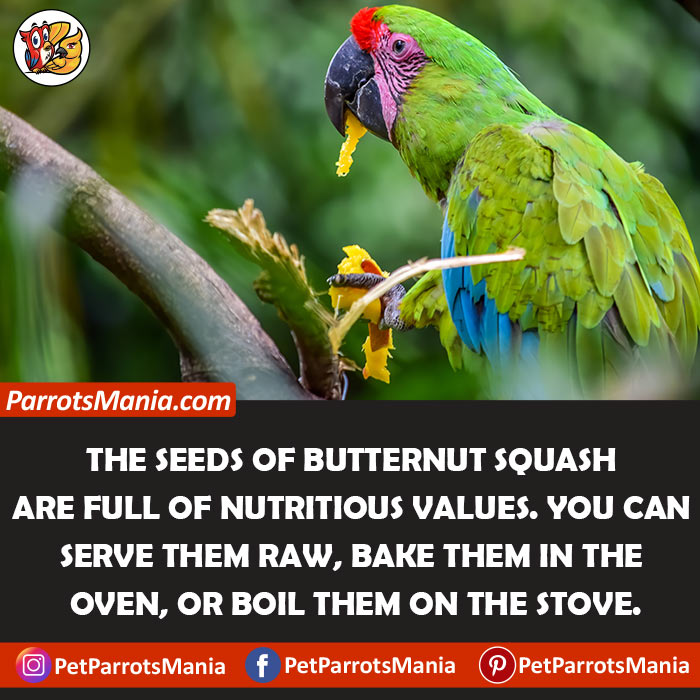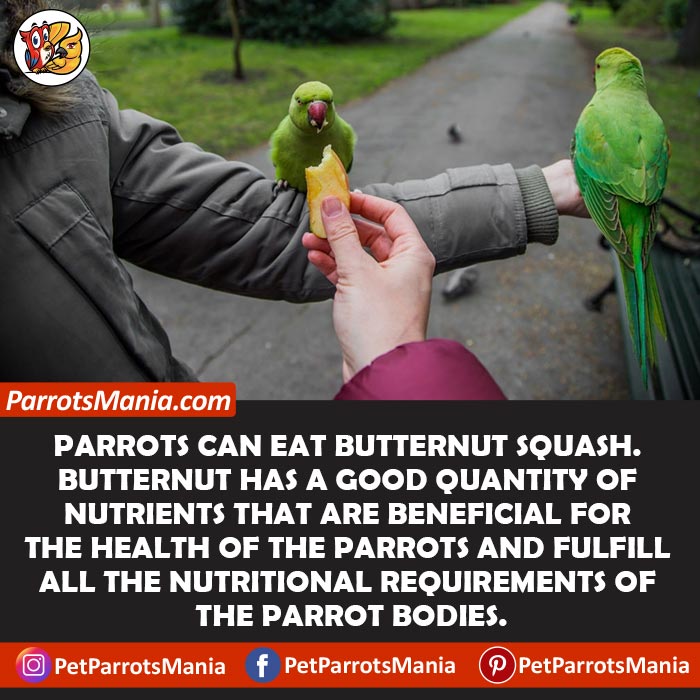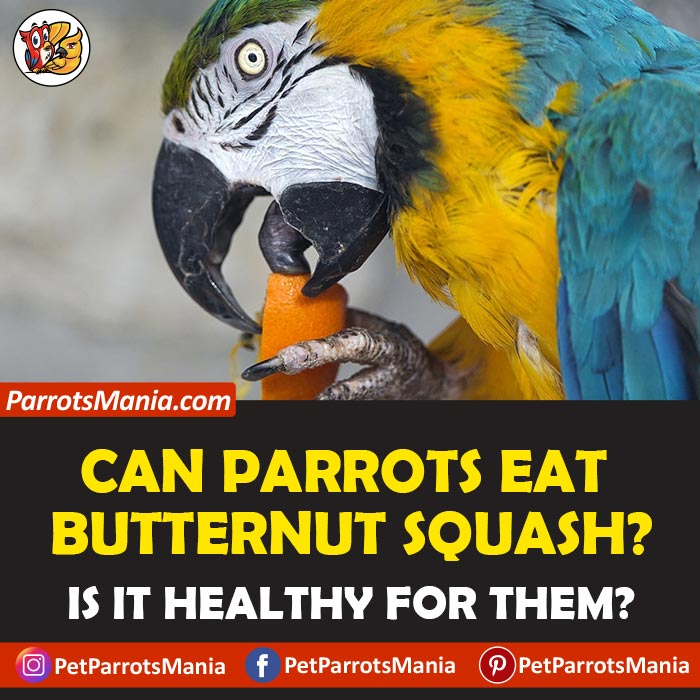Last Updated on October 28, 2022
Parrots are bird species that can eat various foods and love different flavors. They enjoy seasonal and evergreen fruits and vegetables. Seasonal diets contain many nutrients and minerals. Similarly, seasonal squashes are suitable for parrots. They love to eat them. Parrots in the wild feed on different kinds of squashes. Now a question strikes in mind can parrots eat butternut squash? Is it healthy and safe for them? How can we serve them?
Parrots can eat butternut squash. It contains a rich amount of vitamins A and C, which are beneficial for parrots. Parrots should eat butternuts, as they are one of the best foods during the winter. In addition, butternuts are easy to prepare and serve.
Furthermore, we will discuss in detail the benefits and serving methods of butternut. We will also discuss whether baby parrots eat butternuts or not. Do they safely eat butternuts? Let’s get started!
Why Can Parrots Eat Butternut Squash?
Butternut squash is a supernatural food that contains high amounts of Vitamins A and C. It can fulfill 100% of the requirement of Vitamin A and 40% of vitamin C in parrots. Butternut squash is seasonal food used in soups, desserts, and different recipes. Just like humans, parrots also love to eat warm foods in winter. Butternut squash provides all the nutrients required to stay active and live a healthy life.
Can Baby Parrots Eat Butternut Squash?
Yes, they love to feed on butternuts. The sweet taste of butternut squash is edible for babies. Serve it in the smashed or crushed form to baby parrots. You can also feed them raw or boiled Butternut squash. Its nutty flavor is irresistible to babies of many breeds.
Can Parrots Eat Cooked Butternut Squash?
One of the best ways to feed butternut squash to your parrot is by baking it. All you have to do is cut butternut squash in half and let them bake in the oven. Make sure to heat your oven from 350 degrees to 400 degrees.
After baking, place it to cool down, and once it is cool, you can also cut it into small chunks for your parrots. It can be cooked on the stove rather than in the oven, depending upon your feasibility and choice. Make sure to serve them to parrots, according to their choice.
Can Parrots Eat Raw Butternut Squash?
Parrots can also eat raw butternut squash. You only need to cut it into small pieces so they can eat it easily. Raw butternut squash will be more suitable for parrots who don’t like to eat hot and cooked food.

Raw butternut squash is convenient, too, while serving. Cooked butternut squash is soft as compared to raw butternut squash. So, if you think your parrot can chew the raw butternut, then it is better to serve, and if your parrot cannot chew it, avoid giving them.
Can Parrots Drink Butternut Squash Juice?
Butternut squash is suitable for making smoothies, purees, and even juice. It is more time-consuming to make butternut squash juice than other meals, but your parrots love to have this juice. You can make butternut juice and can serve your parrots.
Butternut squash juice is not superb in taste, so you can mix it with other fruits or vegetables for a better taste. A pinch of cinnamon can also increase its flavor.
Can Parrots Eat Butternut Squash Skin?
Butternut squash inside is creamy and delighted for the parrots, but its skin is tough and bitter. So, parrots avoid eating their skin. If you want to serve skin to parrots, bake it to make it soft and palatable.
Parrots can eat skin also, but when they want to eat it. Otherwise, the skin taste is not good to be fed.
Can Parrots Eat Butternut Squash Seeds?
Squash seeds are also edible. We can serve them to parrots. Your parrots may like the butternut squash seeds as rewarding treats. It is rich in fiber and nutrients.

Unlike the tough outer skin of the squash, the seeds are good enough to feed your parrots. The seeds of butternut squash contain high nutrients in them. You can serve them raw, bake them in the oven, or boil them according to your parrot’s taste.
How often can we serve Butternut Squash to parrots?
We can serve butternut squash as the main meal. They are nutritious and healthy for parrots. Offer them as boiled, baked, cooked, or raw in moderation is best to keep your parrots healthy and fit.
Taste Of Butternut Squash:
Butternut Squash is sweeter than most of the other winter squashes. It has a taste similar to sweet potatoes. Your parrots may enjoy the texture of butternut squash if they are eating purees. It is perfect for sweets, in soups, or cooked.
We have discussed how and when we can offer butternut squash to parrots. Now we will discuss its health benefits for parrots. Let’s get started!
Nutritional Benefits Of Butternut squash For The Parrots:
Butternut squash has many dietary benefits for parrots. It is enriched with all the essential nutrients for the parrot’s health. Such as fiber, vitamins A, B, C, and E. They also have other minerals such as calcium, zinc, and magnesium. All of these are highly beneficial for your parrots.

Vitamin A:
- Vitamin A is essential for better vision of your parrot.
- It is also helpful for keeping your parrot’s plumage bright and healthy.
- Adding butternut squash to your parrot’s diet can eliminate vitamin A deficiencies.
- Parrots lacking Vitamin A may cause several health issues such as weight loss, less life span, infections, breeding issues, etc.
Fiber:
As you may know, dietary fiber is one of the essential parts of every parrot’s diet.
- It helps to improve the digestive system of parrots.
- Lack of fiber may cause indigestion and abnormal bowel movements.
- Dietary fibers are gut-friendly for parrots.
Butternut squash is the best treatment for parrots’ gut and digestive issues.
Vitamin C:
Vitamin c helps boost the immune system because it is necessary for your parrot’s health.
- It helps lower blood pressure and keeps a heart healthy.
- It helps in lowering blood sugar.
- It is also required to lower the stress level in your parrots and keep them engaged in different activities.
- It is also a vital nutrient for strong and healthy bones.
Vitamin E:
- It is important for the muscular health of the parrots.
- It protects parrots from fatigue and illness.
- Vitamin E also plays an essential part in an active immune system.
- It also keeps their circulatory system healthy and prevents clotting.
Vitamin B:
- Vitamin B is a helpful nutrient for keeping the integrity of the parrot’s immune system.
- It helps to prevent bodies from internal diseases.
- Vitamin B deficiency can lead to internal nervous, digestive, and muscular diseases.
- It is helpful in the nervous stimulation and coordination of parrots.
Calcium:
- Calcium is an important nutrient for the parrot’s bone and the health of the muscles.
- Calcium is also helpful for maintaining a healthy metabolism.
Zinc:
Zinc is a trace mineral, and most people do not know its benefits.
- Zinc is integral in regulating metabolism and the development of bones and cartilage.
- Butternut squash is a fantastic food for fulfilling the zinc deficiencies in parrots.
- Zinc helps in the proper functioning of enzymes in parrots.
Magnesium:
- Magnesium is commonly present in all food and is required for healthy bones and the metabolism of carbohydrates.
- A magnesium deficiency can cause severe illness and poor growth of the body.
Conclusion:
Butternut squash is healthy and safe for parrots, and it is a full-packed nutritious food that can be served in many ways. They are a good choice of warm food for your parrots. You can serve butternut squash at any time of the day, but the best time is dinner time. You should always serve healthier and tasty food to your parrots for optimal growth, development, and long life span. After knowing about their nutritious values and other benefits, I hope you will feed them to your parrots. You can ask us in the comment section if you have any questions.

